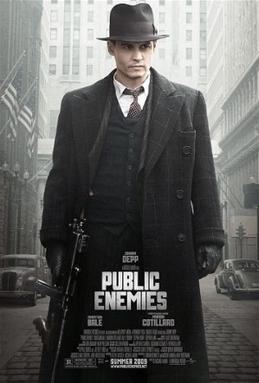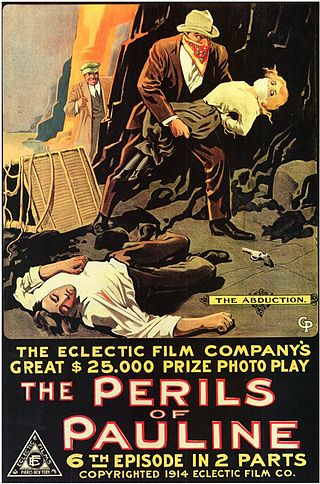The following is an overview of 1928 in film, including significant events, a list of films released and notable births and deaths. Although some films released in 1928 had sound, most were still silent. This year is notable for the introduction of the official mascot of The Walt Disney Company, Mickey Mouse, in the animated short Steamboat Willie, the first film to include a soundtrack completely created in post production.
The following is an overview of 1927 in film, including significant events, a list of films released and notable births and deaths.
1913 was a particularly fruitful year for film as an art form, and is often cited one of the years in the decade which contributed to the medium the most, along with 1917. The year was one where filmmakers of several countries made great artistic advancements, producing notable pioneering masterpieces such as The Student of Prague, Suspense, Atlantis, Raja Harischandra, Juve contre Fantomas, Quo Vadis?, Ingeborg Holm, The Mothering Heart, Ma l’amor mio non muore!, L’enfant de Paris and Twilight of a Woman's Soul.
The year 1912 in film involved some significant events.
The crime film is which Nicole Hahn Rafter described as a genre that film scholars have been reluctant to examine "due to complex nature of the topic." While academics and historians such as Carlos Clarens, Thomas Schatz and Thomas Leitch have given interpretations of the genre, Both Rafter and Leitch suggested that it would be impractical to call every film in which a crime produces the central dramatic situation. Various interpretations of the crime film include Clarens describing them as symbolic representations of crime, law and society while Leitch said they present defining subjects as part of a culture which normailzies a place where crime is both shockingly disruptive and also completely normal, while Rafter said the films in the genre are ones that are defined by plots that focus on crime and their consequences.

Murder, Inc. is a 1960 American gangster film starring Stuart Whitman, May Britt, Henry Morgan and Peter Falk. Filmed in Cinemascope and directed by Burt Balaban and Stuart Rosenberg, the film was based on the true story of Murder, Inc., a Brooklyn gang that operated in the 1930s.

The Rampart scandal was a police corruption scandal which unfolded in Los Angeles, California during the late 1990s and early 2000s. The scandal concerned widespread criminal activity within the Community Resources Against Street Hoodlums (CRASH) anti-gang unit of the Los Angeles Police Department's Rampart Division. More than 70 police officers were initially implicated in various forms of misconduct, including unprovoked shootings and beatings, planting of false evidence, stealing and dealing narcotics, bank robbery, perjury and cover-ups thereof.

Orphans of the Storm is a 1921 American silent drama film by D. W. Griffith set in late-18th-century France, before and during the French Revolution.

Public Enemies is a 2009 American biographical crime drama film directed by Michael Mann, who co-wrote the screenplay with Ronan Bennett and Ann Biderman. It is an adaptation of Bryan Burrough's 2004 non-fiction book Public Enemies: America's Greatest Crime Wave and the Birth of the FBI, 1933–34. Set during the Great Depression, the film chronicles the final years of the notorious bank robber John Dillinger as he is pursued by FBI agent Melvin Purvis, Dillinger's relationship with Billie Frechette, as well as Purvis' pursuit of Dillinger's associates and fellow criminals John "Red" Hamilton, Homer Van Meter, Harry Pierpont, and Baby Face Nelson.

Gaston Glass was a French-American actor and film producer. He was the father of the composer Paul Glass.

The Threepenny Opera is a 1931 German musical film directed by G. W. Pabst. Produced by Seymour Nebenzal's Nero-Film for Tonbild-Syndikat AG (Tobis), Berlin and Warner Bros. Pictures GmbH, Berlin, the film is loosely based on the 1928 musical theatre success of the same name by Bertolt Brecht and Kurt Weill. As was usual in the early sound film era, Pabst also directed a French language version of the film, L'Opéra de quat'sous, with some variation of plot details. A planned English version went unproduced. The two existing versions were released on home video by The Criterion Collection.

For the British writer, see Mary Forbes Evans.

A Woman of Affairs is a 1928 Metro-Goldwyn-Mayer synchronized sound drama film directed by Clarence Brown and starring Greta Garbo, John Gilbert, Douglas Fairbanks Jr. and Lewis Stone. While the film has no audible dialog, it was released with a synchronized musical score with sound effects using both the sound-on-disc and sound-on-film process. The film was based on a 1924 best-selling novel by Michael Arlen, The Green Hat, which he adapted as a four-act stage play in 1925. The Green Hat was considered so daring in the United States that the movie did not allow any associations with it and was renamed A Woman of Affairs, with the characters also renamed to mollify the censors. In particular, the film script eliminated all references to heroin use, homosexuality and syphilis that were at the core of the tragedies involved.

The Bat is a three-act play by Mary Roberts Rinehart and Avery Hopwood that was first produced by Lincoln Wagenhals and Collin Kemper in 1920. The story combines elements of mystery and comedy as Cornelia Van Gorder and guests spend a stormy night at her rented summer home, searching for stolen money they believe is hidden in the house, while they are stalked by a masked criminal known as "the Bat". The Bat's identity is revealed at the end of the final act.

Black Mass is a 2015 American biographical crime drama film about American mobster Whitey Bulger. Directed by Scott Cooper and written by Mark Mallouk and Jez Butterworth, it is based on Dick Lehr and Gerard O'Neill's 2000 book Black Mass: The True Story of an Unholy Alliance Between the FBI and the Irish Mob. The film features an ensemble cast led by Johnny Depp as Bulger, alongside Joel Edgerton, Benedict Cumberbatch, Kevin Bacon, Jesse Plemons, Peter Sarsgaard, Dakota Johnson, and Corey Stoll.

The Circular Staircase is a mystery novel by American writer Mary Roberts Rinehart. The story follows dowager Rachel Innes as she thwarts a series of strange crimes at a summer house she has rented with her niece and nephew. The novel was Rinehart's first bestseller and established her as one of the era's most popular writers. The story was serialized in All-Story for five issues starting with the November 1907 issue, then published in book form by Bobbs-Merrill in 1908.

November Criminals is a 2017 American crime drama film, directed by Sacha Gervasi and written by Gervasi and Steven Knight, and based on Sam Munson's 2010 novel The November Criminals. The film stars Ansel Elgort, Chloë Grace Moretz, Catherine Keener, and David Strathairn.

Mark Felt: The Man Who Brought Down the White House is a 2017 American biographical political thriller film written and directed by Peter Landesman, and based on the 2006 autobiography of FBI agent Mark Felt, written with John O'Connor. The film depicts how Felt became the anonymous source nicknamed "Deep Throat" for reporters Bob Woodward and Carl Bernstein and helped them in their investigation of the Watergate scandal, which resulted in the resignation of President Richard Nixon.

Worth is a 2021 American biographical film written and co-produced by Max Borenstein and directed by Sara Colangelo. Based on the memoir by lawyer Kenneth Feinberg, the film depicts Feinberg's handling of the September 11th Victim Compensation Fund. It stars Michael Keaton, Stanley Tucci, Amy Ryan, Tate Donovan, Talia Balsam, and Laura Benanti. The film premiered at 2020 Sundance Film Festival on January 24, 2020, where it was acquired by Netflix and Higher Ground Productions. The film was given a limited theatrical release in the United States on August 27, 2021, followed by a streaming release on Netflix on September 3.

A serial film,film serial, movie serial, or chapter play, is a motion picture form popular during the first half of the 20th century, consisting of a series of short subjects exhibited in consecutive order at one theater, generally advancing weekly, until the series is completed. Usually, each serial involves a single set of characters, protagonistic and antagonistic, involved in a single story, which has been edited into chapters after the fashion of serial fiction and the episodes cannot be shown out of order or as a single or a random collection of short subjects.















